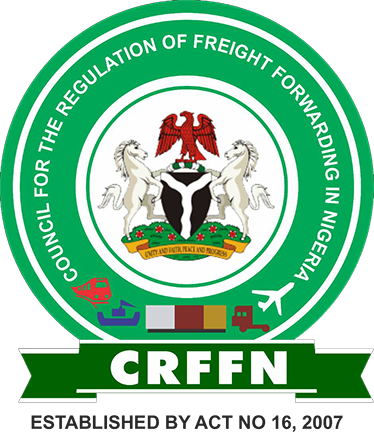
The recent appointment of Mr Kingsley Igwe as the Registrar and Chief Executive Officer of the Council for the Regulation of Freight Forwarding in Nigeria (CRFFN) comes at a critical moment in the Council’s history. The appointment also puts paid to several months of apprehension and anxieties about the future of the distraught government agency.
With his background as former National Secretary of the National Association of Government Approved Freight Forwarders (NAGAFF), Mr Igwe’s appointment has been met with some level of opposition. It has also been met with litigation, by those who believe that he was appointed through the back door, having allegedly not applied for the job, when the vacancy was advertised by the then-Ministry of Transportation.
We recall that the CRFFN was born in 2007 as a possible solution to the myriads of problems which had militated against freight forwarding and logistics practice in Nigeria.
Barrister Sam Nwakohu’s exit in 2023 and the eventual emergence of an acting Registrar, in the person of Mrs Chinyere Uromta was enough troubles. Perhaps, the exclusion of the CRFFN from federal budgetary provision that year was all that was needed to ignite fresh trouble, leading apprehension among the workers who had to endure several months without salary.
In desperation, the Council’s workforce sought help from the Maritime Workers Union of Nigeria (MWUN). In response the union made a demand; that the workers must unionise with the MWUN, they agreed. With this, the MWUN led by Comrade Adewale Adeyanju went to work and unionised employees of CRFFN. The union threatened to go on strike. The rest is history. The CRFFN was reinstated back to budgetary allocation.
Having got a new lease of life; courtesy of the MWUN and the Minister of Marine and Blue Economy, the new CRFFN Registrar must recognize the challenges and expectations that lie ahead. His mandate goes beyond merely managing the CRFFN; it requires him to reshape its image, unite its stakeholders, and drive systemic changes that will establish the Council as a stable and respected institution within Nigeria’s maritime sector. However, it all depends on how well the Registrar understands and takes his job.

One of the most critical tasks before Igwe is fostering unity among the different freight forwarding associations that make up the industry. With a background in NAGAFF, Igwe must make clear his commitment to fairness and impartiality from the outset. Although his connection to NAGAFF might allow him to understand peculiar issues within the sector, it is essential for him to demonstrate an inclusive approach that respects and serves all associations equally, including the Association of Nigerian Licensed Customs Agents (ANLCA), the National Council of Managing Directors of Licensed Customs Agents (NCMDLCA), and other associations with a stake in Nigeria’s logistics chain.
He must demonstrate impartiality and transparency, reassuring all associations that he will serve the interests of the sector as a whole. Any perception of favouritism toward NAGAFF or influence from so-called “godfathers” could heighten suspicion, undermine his credibility and deepen existing rifts.
The focus should be on establishing a balanced, collaborative regulatory framework where every association feels it has an equal seat at the table. Moreover, setting up cross-association committees focused on specific issues within the freight forwarding sector could promote deeper collaboration and reduce factionalism.
One of the steepest challenges Igwe faces is restoring the CRFFN’s reputation. The Council has long been regarded as the most problematic agency under the Ministry of Marine and Blue Economy.
It is imperative for Igwe to take decisive action to reverse this reputation. To begin, he must address internal administrative weaknesses, streamline operations, and eliminate unnecessary bureaucratic obstacles that contribute to inefficiencies.
Improving professionalism within the Council should be a cornerstone of Igwe’s agenda. He must institute a rigorous standard for operational practices and professional conduct across all CRFFN departments, ensuring that each sector adheres to ethical standards. Furthermore, introducing training programmes aimed at boosting the professional skills of the Council’s staff will not only improve service delivery, but will also send a strong message about the CRFFN’s commitment to transformation. In the long term, Igwe should work towards establishing a code of conduct that encourages transparency and accountability in all interactions with freight forwarders, associations, and stakeholders.
Central to the CRFFN’s financial strategy will be the efficient collection of the Practitioner Operating Fee (POF). While the POF has traditionally been limited to the maritime industry, the Council must recognize that freight forwarding activities extend beyond this sector. Extending POF collections to include the aviation industry, where freight forwarding plays a substantial role, could significantly increase the CRFFN’s revenue stream. Ensuring that these fees are collected transparently and fairly will also be crucial in gaining the industry’s trust and cooperation. Igwe must focus on instituting rigorous auditing practices and creating a streamlined system for POF collection that minimizes loopholes and ensures accountability.
Beyond the POF, the Council should explore additional revenue streams, such as offering specialized training and certification programmes for freight forwarders, licensing consultancy services, and forming partnerships with local and international logistics bodies. These measures would diversify the Council’s income, reducing its dependency on POF and federal budget.
One of the strongest tools Igwe has at his disposal is stakeholder engagement. The freight forwarding sector is complex, involving numerous actors including shipping companies, customs agents, government regulatory bodies, and logistics firms. A Registrar who values and actively engages with these stakeholders can effectively lead the CRFFN in a direction that reflects the industry’s collective goals and needs. The good news is that, the new Registrar is from within the industry.
The CRFFN’s reputation as a poorly-managed and ineffective body has created a significant barrier to its success. Restoring the Council’s image will require the new Registrar to implement a thorough rebranding strategy focused on transparency, professionalism, and efficiency. A change in the Council’s public relations approach is essential. One approach to restoring public confidence in the CRFFN would be to highlight successful case studies where the Council has positively impacted freight forwarders, especially in areas like operational efficiency or policy reforms. Publicizing measurable successes and ongoing improvements would provide a counter-narrative to past criticisms. Additionally, by emphasizing ethical standards and regulatory compliance, Igwe can underscore the CRFFN’s commitment to integrity and professionalism, slowly shifting perceptions and building public trust.
Igwe’s predecessors had often struggled with navigating the internal complexities and political pressures within the CRFFN. Some have even seen their tenures prematurely cut short, due to mis-steps or controversies that exposed them to criticism and opposition. Igwe would do well to study the experiences of his predecessors to avoid similar pitfalls. Operating within the CRFFN requires diplomacy, strong ethical grounding, and a keen understanding of the political dynamics at play.
Avoiding political entanglements and focusing on serving the industry impartially will be critical for Igwe’s success. He must be wary of influences that could detract from his mission, including pressure from “godfathers” or other figures seeking to manipulate Council policies and decisions to their advantage. Ensuring that decisions are made transparently and based on objective criteria, rather than external influence, will shield him from much of the internal strife that has challenged past CRFFN leaders.
Kingsley Igwe has the unique opportunity to lead a transformative period for the CRFFN. A Registrar’s legacy is often defined not just by what they achieve, but by the vision they set for the future. By focusing on unity, professionalism, financial sustainability, stakeholder engagement, and innovative practices, Igwe can establish a blueprint for a modern, robust CRFFN that transcends the issues of the past.
The expectations for Kingsley Igwe’s tenure as Registrar of the CRFFN are high, but so are the stakes. In an industry characterized by complexity and competing interests, the path he takes can either reinforce existing tensions or pave the way for a more unified and resilient sector. By working diligently to promote fairness, stability, and collaboration, and by side-stepping the pitfalls that have hindered his predecessors, Igwe can create a foundation upon which the CRFFN can thrive. This is a moment for bold, visionary leadership and a chance to re-birth the CRFFN as a respected, effective regulatory body dedicated to supporting and advancing Nigeria’s freight forwarding sector.















